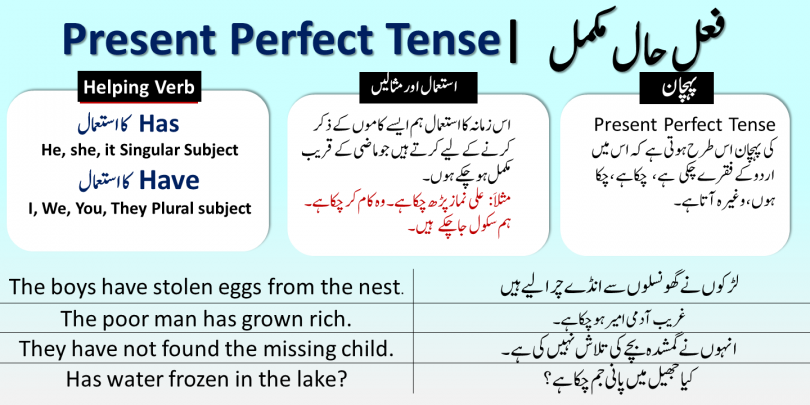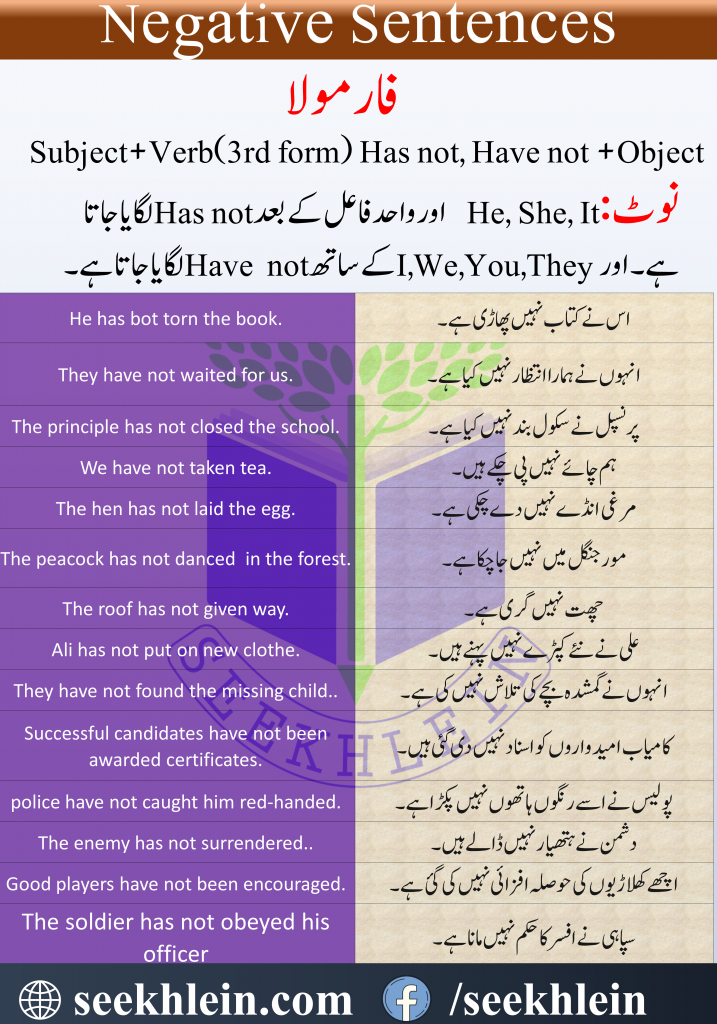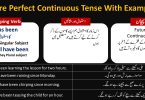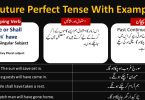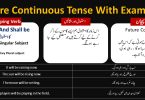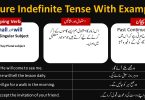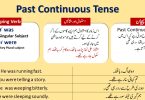What are Tenses?
Tenses play a circular role in the English language. It denotes the time an action takes place, whether sometime in the past, in the past, in the present, or will take some in the future.
انگریزی زبان میں ایک سرکلر کردار ادا کرتا ہے۔ یہ اس وقت کی نشاندہی کرتا ہے جب کوئی عمل ہوتا ہے چاہے ماضی میں ،موجوہ وقت میں، یا مستقبل میں کچھ ہو
Parts of Tenses
There are two parts of tenses
- Active voice
- Passive voice
What is active voice?
When the subject of the sentence performs the verb’s action, we say that the sentence is in active voice. The sentence has an active voice has a strong, direct, and clear tone.
Examples:
This match will be played in Karachi.
The hospital will be inaugurated tomorrow.
Cotton will be grown in a larger area this year.
Steps will be taken to save the city.
The guests will be received at the bus stand.
What is passive voice Tense?
A sentence is in the passive voice, on the other hand when the subject is acted upon by the verb. The passive voice is always constructed with a conjugated form of to be plus the verb’s past participle.
Examples:
This match will be played in Karachi.
The hospital will be inaugurated tomorrow.
Cotton will be grown in a larger area this year.
Steps will be taken to save the city.
The guests will be received at the bus stand.
Importance of Present Perfect Tense
The present perfect tense is used when talking about experiences from the past, a change, or a situation that has happened in the past but is still continuing today. This is an important part of English Grammar since it demonstrates that actions or events in the past have an effect on the present situation.
Why should we learn Tenses?
You should always keep in mind that English is considered the official language in almost all world countries. Learning English has become a necessity today. By learning English you can easily grow yourself in practical life.
But the problem is that how will we improve our English? How can we earn money from this language? In this blog, I am going to tell you how we will do this. The first thing you should do is to learn English grammar and most importantly in grammar are Tenses.
The tenses are the most important part of the English language. If you want to write a correct sentence or wish to say something or want to speak English, you have to learn the tenses. Without learning Tenses you can’t be able to write a blog or write something. The English language has three main time divisions.
- Present Tense
- Past Tense
- Future Tense
But first of all, we are going to learn sentences and their parts
Parts of Sentences
There are two parts of sentences
Subject
Predicate
Subject
A subject is a part of the sentence that contains the person or thing acting in a sentence.
کہتے ہیں۔Subject کسی فقرے میں جس جس چیز یا شخص کے بارے میں بات کی جا رہی ہو اسے
Examples of Subject
Ali has finished his work.
علی اپنا کام ختم کر چکا ہے۔
Ali has played the footbalL.
علی فٹ بال کھیل چکا ہے۔
My mother cooked the food.
میری امی کھانا پکا چکی ہے۔
Predicate
Two types of predicate
- Object مفعول
- Verb فعل
Object مفعول
Definition:
In grammar, an object is a noun, pronoun, or noun phrase on which a verb acts. It falls at the end of the sentence and is governed by a verb or preposition.
اس شخص یا چیز کو کہتے ہیں جس پر کا م ہو رہا ہو۔ Object
Types of Object
Three are types of Object
Direct Object
Indirect Object
Object of Preposition
Examples of Object
Atia has washed the clean.
عطیہ قالین صاف کر چکی ہے۔
Atia has gone to market.
عطیہ مارکیٹ جا چکی ہے۔
Today, he has looked at her.
آج وہ اس کی طرف دیکھ جا چکا ہے ۔
Verb
Definition:
A verb is a word or combination of words that indicates action or a state of being or condition. A verb is a part of the sentence that tells us what subject performs.
کا مطلب کا ہے کام یعنی دوسرے لظوں میں ایک ایسا لفظ ہوتا ہے جو کسی شخص یا چیز کے بارے میں یہ بتاتا ہے کہ وہ شخص یا چیز کیا ہے وہ کیا کرتا ہے یا اس کے ساتھ کیا ہورہا ہے۔
Examples of verb
They have played football with their friends.
وہ اپنے دوستوں کے ساتھ فٹ بال کھیل چکا ہے۔
Matloob has talked to his wife.
مطلوب اپنی بیوی کے ساتھ بات کر چکا ہے۔
Tense
Present Tense فعل حال
Past Tense فعل ماضی
Future Tense فعل مستقبل
Present Tense فعل حال
Types of Present Tense
- Present Indefinite Tense
- Present Continues Tense
- Present Perfect Tense
- Present Perfect Continuous Tense
But first of all, we are going to learn, Present Perfect Tense
Present Perfect Tense فعل حال مکمل
The present perfect tense expresses actions that happened at a time that is not specific.
The Present Perfect Tense is Used to Express:
- actions of duration that occurred in the past of unspecified time
- actions that started in the past but continue to the present time
- actions that started in the past but stopped recently
پہچان :اردو فقروں کے آخر پرچکا ہے، چکی ہے، چکی ہوں،چکےہیں،چکی ہیں،
Sentence structure for Simple sentence
Subject( Third-person singular number)+Has and Have + 3rd form of verb+ Object
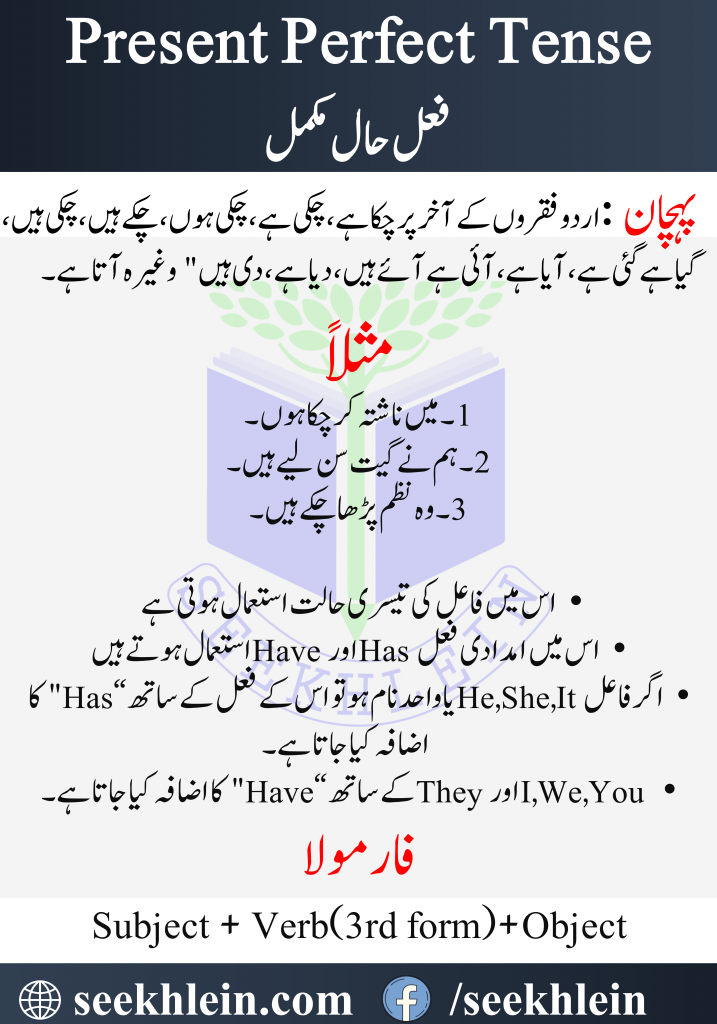
Examples for Positive Sentences
Subject+ Has, Have+ 3rd form of verb+ Object
| That boy has learned the lesson. | اس لڑکے نے سبق یاد کرلیا ہے۔ |
| That girl has written the story. | اس لڑکی نے کہانی لکھ لی ہے۔ |
| They have taught the poem. | وہ نظم پڑھاچکے ہیں۔ |
| We have heard the songs. | ہم نے گیت سن لیے ہیں۔ |
| I have taken breakfast. | میں ناشتہ کرچکا ہوں ۔ |
| The dog has caught the rabbit. | کتے نے خرگوش کو پکڑ لیا ہے۔ |
| The boy has stolen eggs from the nest. | لڑکوں نے گھونسلے سے انڈے چرالیے ہیں۔ |
| Plants have grown into trees. | پودے بڑھ کر درخت بن چکے ہیں۔ |
| Winter has come to an end. | موسم سرما ختم ہوچکا ہے۔ |
| The poor man has grown rich. | غریب آدمی امیر ہوچکا ہے۔ |
| Ali has won the prize. | اسد انعام حاصل کرچکا ہے۔ |
| We have accepted the invitation. | ہم نے دعوت قبول کرلی ہے۔ |
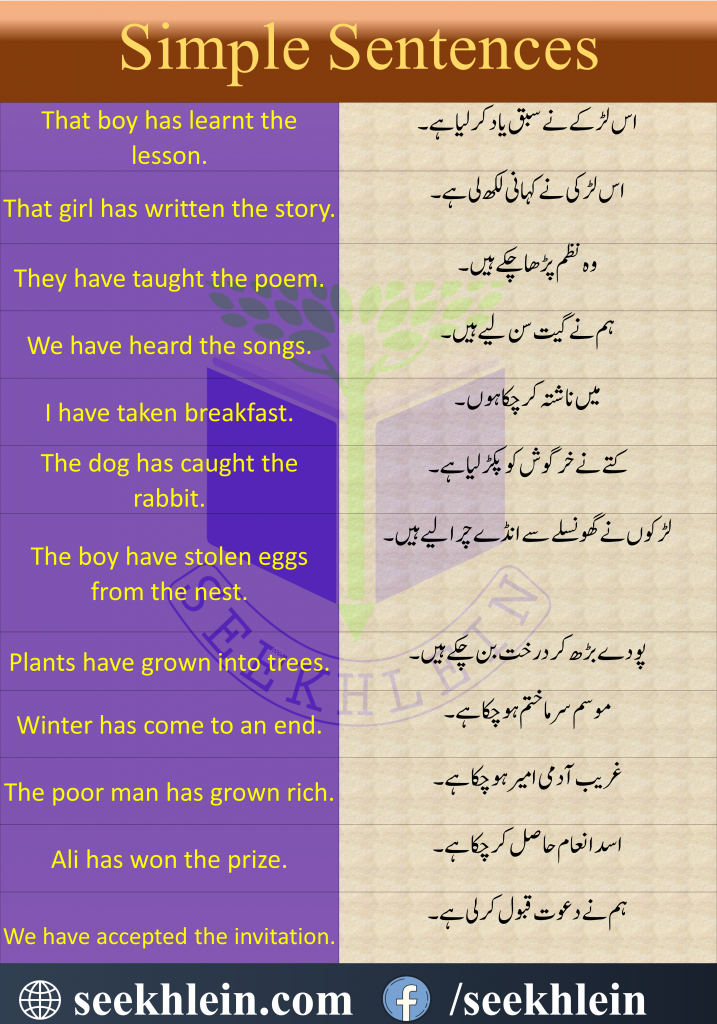
Sentence structure for Negative Sentences
Subject( Third person singular number)+ has or have + not + 3rd form of verb+ Object
| He has not torn the book. | اس نے کتاب نہیں پھاڑی ہے۔ |
| They have not waited for us. | انہوں نے ہمارا انتظار نہیں کیا ہے۔ |
| The principal has not closed the school. | پرنسپل نے سکول بند نہیں کیا ہے۔ |
| We have not taken tea. | ہم چائے نہیں پی چکے ہیں۔ |
| The hen has not laid the egg. | مرغی انڈے نہیں دے چکی ہے۔ |
| The peacock has not danced in the forest. | مور جنگل میں نہیں جا چکا ہے۔ |
| The roof has not given way. | چھت نہیں گری ہے۔ |
| Ali has not put on new clothing. | علی نے نئے کپڑے نہیں پہنے ہیں۔ |
| They have not found the missing child. | انہوں نے گمشدہ بچےکی تلاش نہیں کی ہے۔ |
| Successful candidates have not been awarded certificates. | کامیاب امیدواروں کو اسناد نہیں دی گئی ہیں۔ |
| police have not caught him red-handed. | پولیس نے اسے رنگوں ہاتھوں نہیں پکڑا ہے۔ |
| The enemy has not surrendered. | دشمن نےہتھیار نہیں ڈالے ہیں۔ |
| Good players have not been encouraged. | اچھے کھلاڑیوں کی حوصلہ افزائی نہیں کی گئ ہے۔ |
| The soldier has not obeyed his officer | سپاہی نے افسر کا حکم نہیں مانا ہے ۔ |
Interrogative Sentences for Present Perfect Tense
Subject +has or have+ Verb(3rd form) +Object
Subject + has or have + Verb(3rd form) +Object
(Where, What, Whom, How, Who, When)+ Subject+ + Verb(3rd form)+ Object
(Where, What, Whom, How, Who, When)+Subject+ not+Verb(3rd form)+ Object
| Have you finished the work? | کیا تم کام ختم کرچکے ہو؟ |
| Has the hunter caught the birds?? | کیا شکاری پرندے پکڑچکا ہے؟ |
| Where have you seen this man?? | تم نے اس آدمی کو کہا دیکھا ہے؟ |
| When has your friend married? | آپ کے دوست نے کب شادی کی ہے؟ |
| Has his son killed the man? | کیا اس کے بیٹے نے آدمی کو مارڈالا ہے؟ |
| Have the robbers made good their escape? | کیا ڈاکو صاف بچ کر نکل گئے ہیں؟ |
| Why have they not completed their work? | انہوں نے اپنا کام کیوں نہیں کیا ہے؟ |
| Why have you spent all your income? | تم نے اپنی آمدنی ساری کیوں خرچ کردی ہے؟ |
| Where has he made his maiden speech? | اس نے اپنی پہلی تقریر کہاں کی ہے؟ |
| Has your brother reached the top of the hill? | کیا تمہارا بھائی پہاڑ کی چوٹی پر پہنچ چکا ہے؟ |
| Have you carried the day? | کیا تم بازی جیت چکے ہو؟ |
| Who has spoiled this child? | اس بچے کو کس نے بگاڑا ہے؟ |
| Why has the girl broken the bottle? | لڑکی نے بوتل کیوں توڑی ہے؟ |
| How has he fallen from the roof? | وہ چھت سے کیسے گرا ہے؟ |
| Has water frozen in the lake? | کیا جھیل میں پانی جم چکا ہے؟ |
| Why have you resigned? | تم نے استعفی کیوں دے دیا ہے؟ |
| Has he loaded the gun? | کیا اس نے بندوق بھرلی ہیں؟ |
 Present Perfect Tense with Urdu to English Examples
Present Perfect Tense with Urdu to English Examples
Get the PDF of this lesson at the following link

